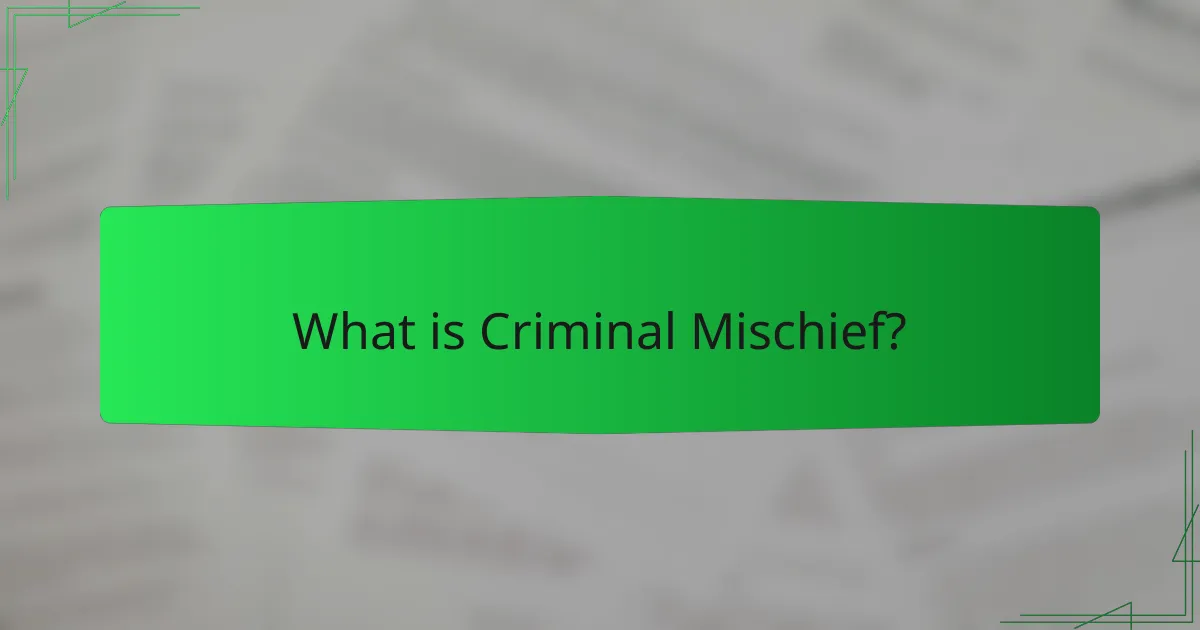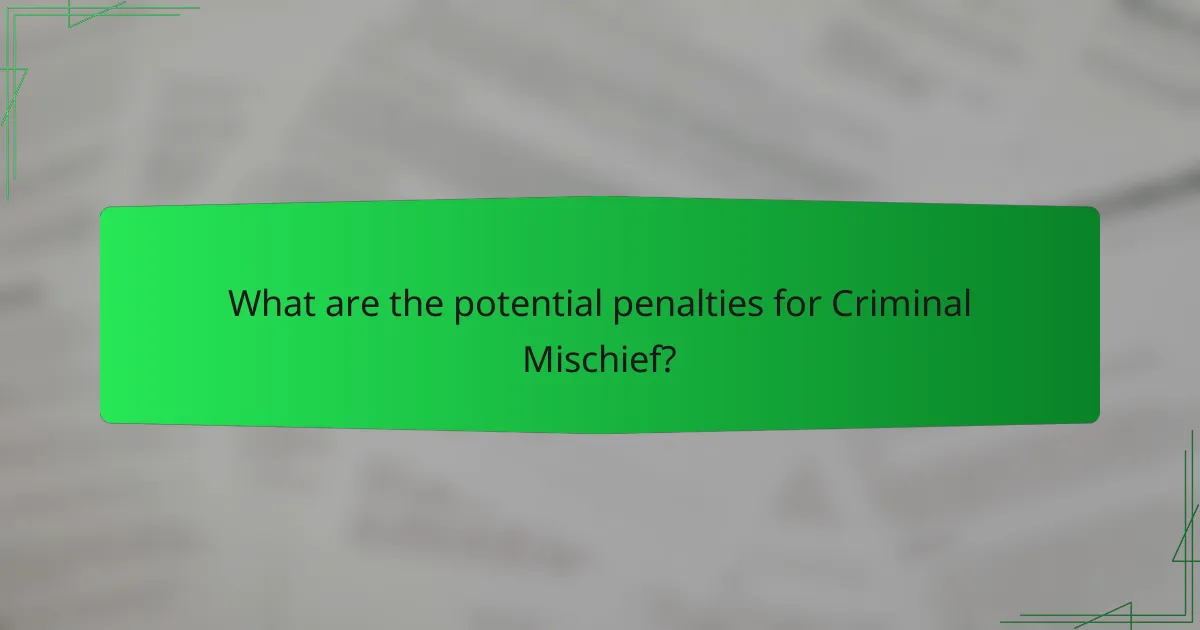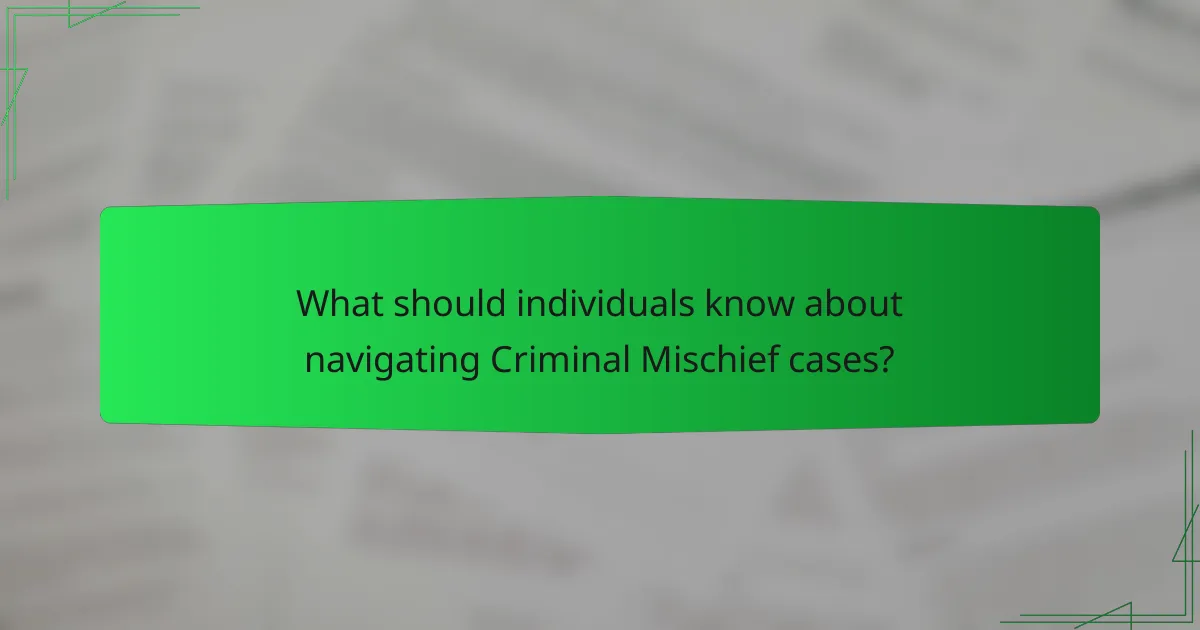Criminal mischief refers to the intentional destruction or damage of another person’s property, encompassing acts such as vandalism, defacement, and tampering. This offense is classified as a property crime, with legal definitions and penalties varying by jurisdiction. The severity of criminal mischief can range from a misdemeanor to a felony, depending on the extent of the damage, with potential penalties including fines, restitution, or imprisonment. Understanding the specific laws and consequences in one’s local area is crucial for individuals involved in criminal mischief cases, as these can significantly impact the legal outcomes and defenses available.

What is Criminal Mischief?
Criminal mischief is the intentional destruction or damage of another person’s property. This act can include vandalism, defacement, or tampering with property. Criminal mischief is typically classified as a property crime. The severity of the offense can vary based on the extent of the damage. Legal definitions of criminal mischief can differ by jurisdiction. In many places, it is considered a misdemeanor or felony. Penalties may include fines, restitution, or imprisonment. Specific laws outline the consequences for committing criminal mischief.
How is Criminal Mischief defined legally?
Criminal mischief is legally defined as the intentional damage to another person’s property. This can involve actions such as vandalism, destruction, or tampering with property. The key element is the intent to cause damage or destruction. In many jurisdictions, criminal mischief is classified as a misdemeanor or felony, depending on the extent of the damage. For example, causing minor damage may result in misdemeanor charges. Conversely, significant destruction can lead to felony charges. Legal definitions may vary by state, but the core concept remains consistent. Criminal mischief laws aim to protect property rights and deter vandalism.
What are the essential elements of Criminal Mischief?
The essential elements of Criminal Mischief include the intentional destruction of property. This can involve damaging, defacing, or tampering with another person’s property. The act must be done without the owner’s consent. Additionally, the perpetrator must have the intent to cause damage or a reckless disregard for the potential damage. Criminal Mischief is often classified based on the value of the property damaged. States may have specific statutes defining these elements. For example, many jurisdictions categorize the offense as a misdemeanor or felony depending on the damage amount.
How does the definition vary by jurisdiction?
The definition of criminal mischief varies by jurisdiction. Each state or country has its own legal framework that outlines what constitutes criminal mischief. For example, some jurisdictions may define it as intentional damage to property, while others include reckless behavior that causes damage. Additionally, the penalties for criminal mischief can differ significantly. In some areas, it may be classified as a misdemeanor, while in others, it can be a felony depending on the extent of the damage. Specific statutes in each jurisdiction detail these definitions and classifications, providing the legal basis for prosecution and penalties.
What are the different types of Criminal Mischief?
The different types of Criminal Mischief include vandalism, graffiti, and property damage. Vandalism involves the intentional destruction or defacement of property. Graffiti is a specific form of vandalism that includes writing or drawing on surfaces without permission. Property damage can encompass a range of actions that impair the value or usefulness of someone else’s property. Other types may include tampering with vehicles or damaging public property. Each type is defined by specific legal statutes in various jurisdictions. Penalties for these actions can vary based on the extent of the damage and local laws.
What constitutes vandalism as a type of Criminal Mischief?
Vandalism constitutes a type of Criminal Mischief involving the intentional destruction or defacement of property. This includes acts such as graffiti, breaking windows, and damaging vehicles. The key element is the intent to cause damage or destruction. Vandalism can occur on both public and private property. Legal definitions vary by jurisdiction but generally include any willful act that harms or alters another’s property. For example, in many states, vandalism is classified as a misdemeanor or felony based on the extent of damage. Statistically, vandalism accounts for a significant portion of property crimes reported annually.
What is the difference between Criminal Mischief and property damage?
Criminal Mischief involves the intentional destruction or alteration of another person’s property. Property damage refers to any harm or destruction to property, regardless of intent. The key difference lies in intent; Criminal Mischief requires a deliberate action, while property damage can occur accidentally. For example, breaking a window intentionally is Criminal Mischief, whereas accidentally damaging a fence while driving is property damage. Legal definitions vary by jurisdiction, but intent is a critical factor in distinguishing between the two.
Why is understanding Criminal Mischief important?
Understanding criminal mischief is important because it defines unlawful acts that cause property damage. This understanding helps individuals recognize the legal implications of such actions. Criminal mischief can lead to civil liability and criminal charges. Knowing the specific laws can prevent unintentional violations. It also aids in conflict resolution and community safety. Awareness of penalties encourages responsible behavior. Understanding these concepts can foster a more law-abiding society. Legal definitions vary by jurisdiction, making local knowledge essential.
How can knowledge of Criminal Mischief help in legal situations?
Knowledge of Criminal Mischief aids in legal situations by providing a clear understanding of the law. It defines what constitutes criminal mischief, which includes intentional damage to property. This knowledge helps individuals recognize the legal implications of their actions. Understanding the potential penalties can influence decision-making and behavior. Legal professionals can use this knowledge to build or defend cases effectively. Familiarity with state-specific laws allows for better legal strategy formulation. Additionally, it can help victims seek restitution or compensation for damages incurred. Overall, it empowers individuals to navigate legal processes more effectively.
What are the societal implications of Criminal Mischief?
Criminal mischief can lead to significant societal implications, including economic loss and community safety concerns. It often results in property damage, affecting individuals and businesses financially. For instance, vandalism can cost communities millions in repairs and lost revenue. Additionally, criminal mischief can foster a sense of insecurity among residents. This insecurity may lead to decreased community engagement and increased fear of crime. Furthermore, repeated incidents can strain law enforcement resources. This ultimately diverts attention from more serious crimes, impacting overall public safety. The societal effects of criminal mischief thus extend beyond immediate damage, influencing community cohesion and trust.

What are the potential penalties for Criminal Mischief?
Penalties for Criminal Mischief can vary significantly based on the jurisdiction and the severity of the offense. Generally, Criminal Mischief is classified as a misdemeanor or a felony. Misdemeanor charges may result in fines up to $1,000 and/or imprisonment for up to one year. Felony charges can lead to more severe penalties, including fines exceeding $10,000 and imprisonment for multiple years, depending on the extent of damage caused. For instance, if the damage exceeds a specific monetary threshold, the offense may escalate from a misdemeanor to a felony. Each state has its own laws detailing these penalties, reflecting the importance of local statutes in determining the consequences for Criminal Mischief.
How are penalties for Criminal Mischief determined?
Penalties for Criminal Mischief are determined based on the severity of the offense and the extent of damage caused. Factors include the monetary value of the property damaged or destroyed. Generally, higher damage values lead to more severe penalties. The jurisdiction’s laws also play a critical role in defining penalties. Offenses can range from misdemeanors to felonies. Prior criminal history may influence sentencing outcomes. Additionally, mitigating or aggravating circumstances can affect the final penalty. For example, if the act was premeditated, penalties may increase. Each case is evaluated individually based on these criteria.
What factors influence the severity of penalties?
The severity of penalties for criminal mischief is influenced by several factors. These factors include the extent of damage caused, the intent behind the act, and the offender’s criminal history. Greater damage typically results in harsher penalties. If the act was premeditated, penalties may be more severe. A prior criminal record can also lead to increased penalties. Jurisdictional laws play a significant role in determining specific penalties. Additionally, the impact on victims can influence the severity of the sentence. Community standards and the nature of the offense are also considered by the court.
How do prior offenses affect sentencing for Criminal Mischief?
Prior offenses significantly influence sentencing for Criminal Mischief. Courts often consider an individual’s criminal history during sentencing. A history of prior offenses may lead to harsher penalties. Repeat offenders may face increased fines or longer imprisonment. Sentencing guidelines often include enhanced penalties for repeat offenses. For example, a first-time offender may receive a lighter sentence than someone with multiple convictions. Additionally, some jurisdictions have mandatory minimum sentences for repeat offenders. This approach aims to deter future criminal behavior. Overall, prior offenses can result in more severe consequences for Criminal Mischief convictions.
What are the common penalties associated with Criminal Mischief?
Common penalties for Criminal Mischief include fines, restitution, and imprisonment. Fines can range from hundreds to thousands of dollars depending on the severity of the damage. Restitution requires the offender to compensate the victim for the loss incurred. Imprisonment can vary from a few days to several years. The length of imprisonment is determined by the degree of the offense. Misdemeanor charges typically result in shorter sentences, while felony charges can lead to longer terms. In some cases, community service may also be mandated. These penalties aim to deter future offenses and promote accountability.
What fines are typically imposed for Criminal Mischief?
Fines for criminal mischief vary by jurisdiction and the severity of the offense. Typically, fines can range from $100 to $10,000. Misdemeanor charges often result in lower fines, generally between $100 and $1,000. Felony charges can lead to significantly higher fines, sometimes exceeding $10,000. In some cases, restitution may also be ordered to compensate for damages caused. The specific amount is determined by factors such as the extent of damage and prior criminal history.
What are the possible imprisonment terms for Criminal Mischief?
Imprisonment terms for Criminal Mischief vary by jurisdiction. Typically, they can range from a few months to several years. For example, misdemeanor charges may lead to up to one year in jail. Felony charges can result in imprisonment for one to five years or more. Severity often depends on the extent of damage caused. Some states impose harsher penalties for repeat offenders. Legal definitions and penalties can differ significantly across regions. Always consult local laws for precise information.
How can individuals defend against Criminal Mischief charges?
Individuals can defend against Criminal Mischief charges by establishing lack of intent. Proving that the act was unintentional can be a strong defense. They may also demonstrate that they had permission to use or alter the property in question. Presenting evidence that shows the property was not damaged or that the damage was minimal can further support their case. Witness testimonies can corroborate their version of events. Additionally, showing that the individual was falsely accused can be effective. Each of these strategies can help mitigate or dismiss the charges against them.
What are common defenses used in Criminal Mischief cases?
Common defenses used in criminal mischief cases include lack of intent, consent, and mistake of fact. Lack of intent argues that the accused did not willfully damage property. Consent indicates that the property owner allowed the action, negating criminal liability. Mistake of fact involves a misunderstanding about the ownership or condition of the property. Each defense can significantly impact the outcome of a case. Legal precedents support these defenses, demonstrating their relevance in court. For instance, cases like State v. Decker illustrate how lack of intent can lead to acquittal.
How can evidence be used to contest Criminal Mischief allegations?
Evidence can be used to contest Criminal Mischief allegations by demonstrating a lack of intent or ownership. For instance, if a defendant can show they did not cause the damage, it may negate liability. Surveillance footage may provide proof of another individual committing the act. Witness statements can corroborate the defendant’s alibi or lack of involvement. Documentation of property ownership can establish that the defendant had no reason to damage the property. Additionally, expert testimony may clarify the nature of the damage and its cause. Each piece of evidence can significantly impact the credibility of the allegations.

What should individuals know about navigating Criminal Mischief cases?
Individuals should know that navigating Criminal Mischief cases involves understanding the legal definitions and potential penalties. Criminal Mischief refers to the intentional destruction or damage of another person’s property. Each jurisdiction has specific laws outlining what constitutes Criminal Mischief. Penalties can vary significantly based on the severity of the offense and the amount of damage caused. For example, minor damage may result in misdemeanor charges, while severe damage can lead to felony charges. Individuals should gather evidence and documentation related to the incident. Consulting with a legal professional is advisable to navigate the complexities of the case effectively. Understanding the local laws can also aid in preparing a strong defense.
What steps should one take if accused of Criminal Mischief?
If accused of Criminal Mischief, the first step is to remain calm and not admit guilt. Next, contact a qualified attorney who specializes in criminal law. The attorney can provide legal advice tailored to the specific situation. Gather any evidence that supports your innocence, such as photographs or witness statements. Do not discuss the case with anyone other than your attorney. Attend all court dates and comply with legal procedures. Understanding the charges and potential penalties is crucial, as Criminal Mischief can vary in severity. Following these steps can help in managing the situation effectively.
How can seeking legal counsel benefit someone facing these charges?
Seeking legal counsel can provide critical advantages for someone facing criminal mischief charges. A qualified attorney can navigate the complexities of the legal system. They can offer personalized advice tailored to the specific circumstances of the case. Legal counsel can help in understanding the charges and potential penalties involved. An attorney can also identify possible defenses that may reduce or dismiss the charges. Furthermore, having legal representation can enhance negotiation outcomes, potentially leading to plea deals or reduced sentences. Statistics show that defendants with legal representation often achieve better outcomes than those without. Legal counsel ensures that the individual’s rights are protected throughout the legal process.
What resources are available for understanding Criminal Mischief?
Resources for understanding Criminal Mischief include legal textbooks and academic journals. These sources provide in-depth analyses of laws and case studies. Online legal databases like Westlaw and LexisNexis offer comprehensive legal definitions and interpretations. Government websites often outline statutes and penalties related to Criminal Mischief. Additionally, law enforcement agencies may provide community resources and educational materials. Legal aid organizations can also assist in understanding rights and consequences. State-specific legal guides are valuable for localized information.
Where can individuals find legal information regarding Criminal Mischief?
Individuals can find legal information regarding Criminal Mischief through state government websites. These sites typically provide statutes and legal definitions. Local law libraries also offer resources on criminal laws. Legal aid organizations may have guides and information available. Additionally, online legal databases like Westlaw or LexisNexis contain detailed legal information. Consulting an attorney can provide personalized legal advice on Criminal Mischief. These resources ensure access to accurate and relevant legal information.
What support systems exist for victims of Criminal Mischief?
Victims of criminal mischief can access various support systems. Law enforcement agencies provide immediate assistance and documentation for incidents. Local victim advocacy groups offer emotional support and resources. Legal aid organizations can help victims understand their rights and options. Insurance companies may assist with claims related to property damage. Community organizations often provide financial assistance for repairs. Counseling services are available to help victims cope with trauma. These support systems aim to aid victims in recovery and restoration.
What are best practices to avoid Criminal Mischief charges?
To avoid Criminal Mischief charges, individuals should refrain from damaging or defacing property. Respecting others’ property is essential. Always seek permission before using or altering someone else’s belongings. Maintain clear communication with neighbors to prevent misunderstandings. Engage in conflict resolution rather than escalating disputes. Familiarize yourself with local laws regarding property damage. Document any interactions involving property to provide evidence if needed. Lastly, consider mediation for disputes to avoid potential criminal implications.
Criminal Mischief refers to the intentional destruction or damage of another person’s property, encompassing acts such as vandalism and defacement. This article provides a comprehensive overview of criminal mischief, including its legal definitions, essential elements, and variations across jurisdictions. It discusses different types of criminal mischief, the distinctions between criminal mischief and property damage, and the potential penalties associated with such offenses. Additionally, the article explores common defenses against criminal mischief charges, the societal implications, and resources available for victims and individuals accused of these crimes. Understanding these aspects is crucial for navigating the legal landscape surrounding criminal mischief effectively.